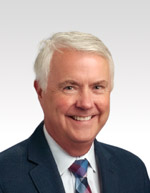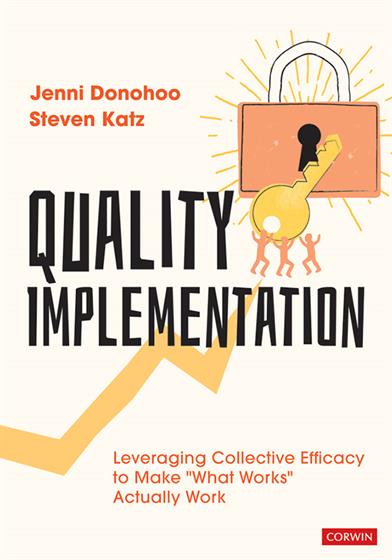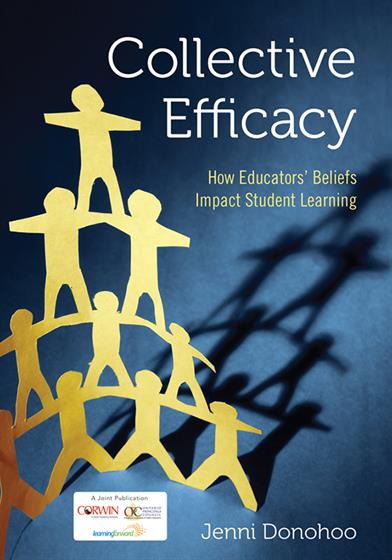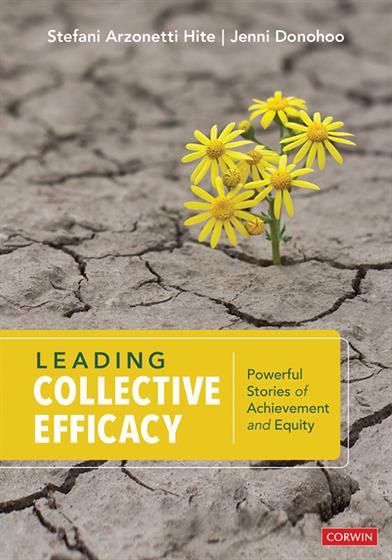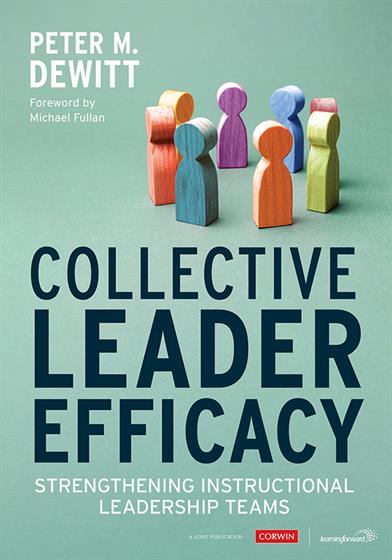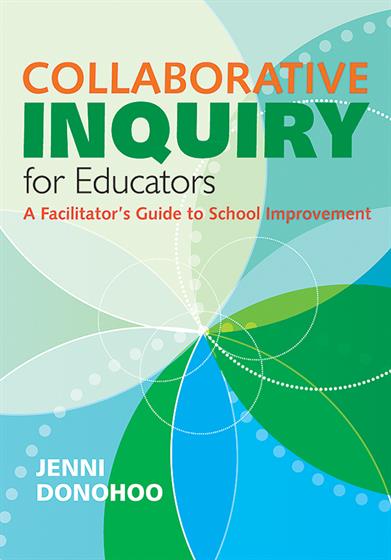Series 5 Leaders Coaching Leaders Podcast
[00:00:00.81] ANNOUNCER: Welcome to Corwin's Leaders Coaching Leaders
podcast with host Peter Dewitt. This podcast is from education leaders for
education leaders. Every week, Peter and our guests get together to share
ideas, put research into practice, and ensure every student is learning not by
chance, but by design.
[00:00:20.11] TANYA GHANS: Hi, Peter.
[00:00:21.46] PETER DEWITT: Hi, Tanya. How are you?
[00:00:22.87] TANYA GHANS: I'm really good. How are you?
[00:00:25.18] PETER DEWITT: I'm doing very well, thank you.
[00:00:27.01] TANYA GHANS: Yeah, another great talk today.
[00:00:30.16] PETER DEWITT: Yes.
[00:00:31.63] TANYA GHANS: Two really great people, Jenni Donohoo and Steven
Katz, they are our guests today on the show for our listeners. I'll tell you a
little something about each of them. Jenny is a five-time best selling author,
a professional learning facilitator, and Director of the Jenni Donohoo Center
for Collective Efficacy. And she's got a PhD in educational studies and
supervisory officer qualifications.
[00:01:00.82] Steven Katz is the Director of Apporia Consulting, faculty
member at the Implied Psychology and Human Development at the Ontario Institute
for Studies in Education. His areas of expertise are long. But I'll just mention
a few, cognition and learning, teacher education, and network learning
communities. He has a PhD in human development and applied psychology, which
will really come through, listeners, in our conversation today. And he's
received the Governor General Medal for Excellence.
[00:01:33.58] And I think if we had to find a broad topic for today's
discussion, though it goes on a lot of really interesting tangents or
interesting places, they really try to and do quite well unpack the difference
between adaptive and technical, and then really lean into helping people really
see what adaptive looks like and what it entails. And what I thought was
interesting is how when I've heard about adaptive and technical in the past,
sometimes they're bucketed as though certain activities are discrete.
[00:02:10.64] They are either just technical. Or they are adaptive, as
opposed to any particular activity can have both lenses. So scheduling can seem
like a very technical thing. It's just let me put the pieces in the right place.
[00:02:27.06] But there's also this adaptive lens that needs to be taken to
it if you actually want to think about, how are you actually having productive
collective time with your teachers? So that was just one thing that I thought
really stood out. And there's so many of those in today's conversation.
[00:02:43.32] PETER DEWITT: Yeah, I think starting off, first and foremost,
they're very smart people. And I have to up my game when I'm going to be
hanging out with either one of them. I do a lot of work with Jenny. She's been
a very good friend for years. And I deeply respect her.
[00:02:58.01] And Steven is somebody whose work I've gotten to know over the
past few years due to Jenny introducing me to him. And he's been working with a
group that Jenny and I both worked with over the past year. And I wanted to
start off-- and audience won't know. They'll hear.
[00:03:15.51] I wanted to start off with this whole idea of adaptive
challenge because that's something that when I'm using language, I use the
words around adaptive challenge quite a bit when I'm working with groups. So
for me, it was a good entry point into the conversation that yes, where we went
from there was deeply interesting because what I think is pretty valuable to me
is that even though they're both researchers, sometimes when we work with a
researcher, they don't have a clarity of language because maybe they're not
tied to the field.
[00:03:54.13] So they can talk about the technical language. They can use
the technical language of research. But they don't always offer me the
practical side of things. And Jenny and Steven, as people will hear, definitely
do not do that. They are really good at offering the practical side.
[00:04:12.97] In fact, at one point, people are going to hear me talk to
Steven about the fact that he painted a really clear picture for me around a
couple of things. So they're really excellent at the research side, which is
important. But also, they can blend in the very practical side. And that's
because they both are in the field quite often.
[00:04:33.52] So today was just-- I was looking forward to this conversation
in general because I know the two of them. But even when you're looking forward
to a conversation, you might be let down by the conversation. And in fact,
today we were able to go into places that the three of us have not discussed
before. So it was really interesting.
[00:04:55.78] TANYA GHANS: Yeah, yeah, really grounded. And audience
members, I learned a term to describe Peter, which is confident humility. And
when you listen to this podcast, you're going to hear more about what that is
and a lot more terms that you might think you know. But I think you're going to
have some additional knowledge around them.
[00:05:14.95] So this is a really great list. And get your pencils out, your
paper out. Take your notes because it's one of those.
[00:05:21.27] PETER DEWITT: Pencil and paper? What are you, old school? Take
out your laptop and your iPad thingy.
[00:05:26.70] TANYA GHANS: Research says you learn the best with pencil to
paper.
[00:05:30.96] PETER DEWITT: That's true. All right, well, happy listening
for this one.
[00:05:35.24] TANYA GHANS: Happy listening. See you guys on the other side.
[00:05:41.64] PETER DEWITT: Jenni Donohoo, Steven Katz, welcome to the
Leaders Coaching Leaders podcast.
[00:05:46.14] STEVEN KATZ: Thank you.
[00:05:46.95] JENNI DONOHOO: Thank you.
[00:05:48.33] PETER DEWITT: Jenni, I know you get the award for getting up
the earliest this morning because you're actually working in Anchorage this
week. So it's 4:30 in the morning for you. So thank you for getting up so
early.
[00:06:01.11] JENNI DONOHOO: No problem. I had trouble sleeping anyway.
[00:06:04.98] PETER DEWITT: So you just stayed up. You pulled in all
nighter. That's good to know. Listen, you both have your individual work,
obviously. And then you've got work that you do together. And you're quite the
duo.
[00:06:18.36] One of the things that I wanted to start off by talking
about-- in the podcast, we always try to develop a common understanding around
words that we use because I think often we have a common language. But we don't
have a common understanding.
[00:06:32.79] And one of the phrases that you both have used and you've
written about it in articles is that of adaptive challenges, which I think is
such an awesome way to be able to look at what people are experiencing within
school. I feel like too often, people judge themselves or they'll say things
like I failed. Or we have this huge barrier.
[00:06:55.20] And it's always this kind of negative way to say it. But when
I hear adaptive challenges, it almost feels like there's more of not
necessarily a positive spin, but maybe a healthier spin on it. So Steven, I'll
start with you. What is an adaptive challenge? And why did the two of you start
using that language?
[00:07:15.28] STEVEN KATZ: So the language actually kind of grows out of the
literature that made the distinction between adaptive and technical challenges
a number of years back. We've really kind of gleaned on to the language of
adaptive challenge because as we've become more preoccupied with the broader
notion of quality implementation, which is the idea of being able to take
really good, well-tested ideas and make them work for you in your context, the
concept of adaptive challenge became really significant because an adaptive
challenge is really a challenge that doesn't lend itself to a paint by number
solution or the ability to follow any algorithm for almost foolproof
implementation.
[00:08:06.18] And in fact, what adaptive says is we need to actually think
about how we can be creative and innovative to solve something that isn't easy,
that often is fundamentally anchored in people's thoughts, or beliefs, or
emotions. It really leans into the notion of context, suggests that context
isn't noise to be filtered out, but an understanding of a environment, an
implementation environment that we need to lean into.
[00:08:42.39] And what it really says is you most likely are going to have
to experiment your way through an adaptive challenge to really understand what
works in that space. Whereas a technical challenge, you could just look up the
answer, or ask an expert, or follow an algorithm down a single pathway to a
clear conclusion.
[00:09:02.01] PETER DEWITT: That is probably one of the clearest-- when I
say common language and common understanding, that's one of the clearest. So
thank you for that, Steven. You never disappoint where that's concerned. Jenni,
you and Steven are both in the field. And what are some adaptive challenges? Is
there an adaptive challenge that you see schools experiencing quite a bit more
than others right now? I don't even know if that's necessarily a great
question.
[00:09:29.76] JENNI DONOHOO: No, that's a great question. And just going
back to the distinction between adaptive and technical, if we think of
technical, like Steven said, you can usually rely on someone or the solutions
don't require a lot of time or effort.
[00:09:44.37] Scheduling common prep time for teachers to meet, for example,
that's something that we can do sometimes quite easily. Time always becomes an
issue. But scheduling that common prep time, if we put an adaptive lens on
that, it really is more around increasing teachers' motivations and desires to
collaborate.
[00:10:02.73] Let me give you a few more examples. Technical, we might
utilize protocols for examining student work. But if we put an adaptive lens on
that, it's more around creating the conditions for the joint responsibility for
student learning, adhering to existing PLC structures as opposed to putting
that adaptive lens on it and looking more about being purposeful about
observing the impact of our collaborative efforts. Those are just some of the
things that I see around that adaptive piece in schools today.
[00:10:36.18] PETER DEWITT: And what I really enjoy about the two of you is
that, Steven, you can start off with giving us a clear understanding. Then
Jenny, you will go deeper and vise versa with how that looks. One of the things
that I've learned from the two of you quite a bit over the years is the idea of
intentionality.
[00:10:55.44] Steven, I've read a lot of your work, where you talk about things
like the activity traps, which I thought it's just such an interesting concept
to look at because when I'm doing walkthroughs, which I do quite a bit when I'm
visiting schools, it's very interesting to kind of look and see the activity
the teachers are engaging in, but realize that they're not necessarily talking
about the learning.
[00:11:22.54] And one of the other things that you focused on a lot is the
idea that it's really about changing the behavior of people. When we're engaged
in this work, it's about changing the behavior of people. Why is all this work
seemingly more difficult than we expect it to be?
[00:11:44.34] Jenni, you were talking about technical challenges versus
adaptive challenges. I think a lot of people are like, well, we did the
technical part, so everything else should come together. But it's actually the
adaptive part that is really difficult. Why is that so difficult?
[00:11:59.11] STEVEN KATZ: I I'm a cognitive psychologist by trade. And I'm
just going to fall back on my professional answer for that and say it's
difficult because there's people involved. And you should never underestimate
how complicated people can be.
[00:12:14.08] And we are doing something that is really difficult. It is
really difficult to do at scale. It is in no way homogeneous. And anybody who
has spent time with a couple of kids at a time will know how very different
they are, that there is certainly predictability in things like developmental
sequences, and milestones, and expectations.
[00:12:42.97] And lots of times, we rely on the things that have worked for
us really well in the past. But often we find ourselves confronted with
situations where the tried and true doesn't work. And then we have to say,
well, now what am I going to do about this?
[00:12:58.72] And so I think when you think about the variables that are
involved in the spaces that we live and work in, very different contexts. I'm a
systems person, always understanding that everything is nested in something
else. You can't look at a child without thinking about the broader family, the
family without the community, the community without the broader environment.
[00:13:23.50] Everything is connected with multiple linkages. And the
metaphor I always like to use is you drop a pebble in a pond. And the ripples
go far and wide. And so when you take a systems thinking approach to the
question that you asked, it's not just about the simplicity of the work in an
individual interaction. It's about how that interaction is nested in something
that is so much bigger and so much more complicated.
[00:13:52.27] I mean, we know how much research tells us that there's more
variability between classrooms within a school than between schools themselves.
Now nest that within very different schools, very different communities, very
different social dynamics and social environments. And there's just a lot of
moving parts.
[00:14:09.32] And so the ability to come to the work with a mindset of
saying I have to figure this out. I've got to be a really good analyst, really
understand what makes the various people in this relationship tick, and then
understand how I use that profile to come up with a fit for purpose intentional
strategy, that I will try my absolute best, stay involved long enough to see
how it lands, and make the necessary modifications and adjustments, and just
keep trying.
[00:14:38.26] And that's really why Jenni's work on collective efficacy is
so powerful in this space because if you don't believe that you can ultimately
make that impact, you're going to just want to quit and give up.
[00:14:51.27] PETER DEWITT: Well, you gave me a good segue because some of
that, Steven, I have to admit will sound overwhelming to people.
[00:14:58.46] STEVEN KATZ: It is.
[00:14:59.40] PETER DEWITT: They might think, oh my gosh, I'm going to run
the other way now. But let's get to more of the granular, Jenni. And that's
where collective efficacy comes into play. What are the things that you do
intentionally with groups because you facilitate a lot of these sessions around
collective efficacy? What are the intentional things you do? knowing that
changing beliefs is hard, knowing that learning takes a lot more time than just
a one-day workshop, what are the things that you intentionally do and what
other people could do, where collective efficacy is concerned that would
actually help be more impactful with what Steven was just talking about?
[00:15:38.92] JENNI DONOHOO: Well, I think one of the reasons-- just
building on what Steven was saying-- as to why adaptive challenges are
difficult is because it really requires a shift in beliefs and a change in
values, rules, relationships, and approaches. And one of the technical versus
adaptive shifts that we need to make is from a technical perspective, using
demographic data to explain success and/or failure.
[00:16:06.16] The adaptive piece is really shifting attributions for success
and failure to causes that are within our control. And I think part of the
problem too is that we really get stuck in unhelpful stories. We get stuck in
that same thinking that really those unhelpful thoughts that create bogus
barriers to achievement.
[00:16:30.85] And so as Steven said, collective efficacy becomes an
important concept because the more efficacious an individual teacher or a team
of teachers feel, then the more likely they are to be successful in having
those evidence-based approaches work in their classrooms and in their schools,
the more likely they are to realize improvements in student progress and
achievement.
[00:16:55.67] So I think first, building awareness that collective efficacy
exists, what it is, why it's important, building awareness of the strength of
the evidence, that it's the number one factor according to Hattie's research
around what matters most in improving student achievement, and then coming to
common understanding of what it really looks like, feels like in a school,
tapping into sources of efficacy.
[00:17:20.62] Based on Bandura's work, he identifies mastery experiences as
a really potent source of efficacy. So helping teachers see the successes that
they're having, helping others see successes, so building on those vicarious
experiences and having them understand the cause and effect relationship
becomes really important. That teaching causes learning.
[00:17:46.66] PETER DEWITT: And I'm going to bounce back between the two of
you on this. And thank you for that, Jenni, because one of the things that I
had been reading from Bandura lately is, is there a double-edged sword to
efficacy in general? Because I've read some things from him that said that
sometimes when people are overly efficacious, they're not necessarily seeing
their blind spot.
[00:18:09.41] And I wonder if that fits into, Steven, you do a lot of great
work around confirmation bias. Is there a double-edged sword when you're
focusing on collective efficacy, where there are people that are in the room
that feel very confident, but it doesn't necessarily mean they're competent?
[00:18:30.02] STEVEN KATZ: Yeah, and in fact, it's interesting because that
is, in fact, a fairly well known cognitive bias. It's called the Dunning Kruger
effect. And the Dunning Kruger effect is the term that we use to describe a
phenomenon where confidence outstrips competence. So people feel more confident
than they should.
[00:18:52.07] The flipside of that is the imposter syndrome, where people
are less confident that they should be and, in fact, are more competent than
they think they are. And both the Dunning Kruger effect and the imposter
syndrome both need to be intentionally interrupted. We went in the places where
our confidence outstrips our competence. We have to lean into some humility
there.
[00:19:20.39] And in places where our competence is in fact more significant
than our confidence, we actually need to lean in to being more confident.
That's really why the secret sauce of leadership-- and in fact, it's one of the
most significant leadership behaviors that we find across sector is the phrase
confident humility because confident humility is the perfect blend between I'm
confident in knowing what I know and am willing to execute and make decisions
in that space.
[00:19:58.20] But I'm also humble enough to know what I don't. And I know
who I need to connect with and surround myself with to compensate for the
places where I don't have strength. Now, if you have confidence without the
humility, you have arrogance. And that's where the Dunning Kruger effect lives.
[00:20:15.62] But if you have humility without confidence, then you have
insecurity. And that's where the imposter syndrome lives. So we kind of need a
both/and in this relationship. This is kind of where I'm spending most of my
time now in this work. We need a both/and in this relationship, not an
either/or.
[00:20:34.42] PETER DEWITT: I really like that. Actually, Steven, when you
were doing that, I was painting a picture in my head of an image to be able to
see that I was just really-- sorry to say it this way-- but beautifully said
because I could actually just start painting this picture. And you just made
that so clear.
[00:20:51.55] Jenni, one of the things that I think is really hard in the
work that we do is that we might go in to do coaching or we might be going in
to do like one day workshops. And some people have this air of confidence. And
they can sometimes even cite the right researchers and stuff like that.
[00:21:13.51] How do we get past that almost surface level to get to a
deeper understanding of whether they know it or not?
[00:21:25.52] JENNI DONOHOO: Well, I think that Steven would agree with me
here. One of the things that I know that Steven and I have been working toward
for many years in our work in supporting professional learning in school
districts is utilizing high quality professional learning designs and
collaborative inquiry, when we get teachers to come together to really identify
a student learning need, come together to investigate evidence-based approaches
and then utilize them in their classrooms.
[00:21:55.56] I think through that process and then analyzing, did what we
do make a difference? If not, why and why not? And if it did, then how can we
learn more about this? And that iterative cycle of engaging together in an
inquiry around student learning needs, I think, helps teachers realize that
perhaps some of the approaches or some of the things they thought they knew
maybe isn't true.
[00:22:22.10] But they learn that through that process on their own, rather
than someone coming in and telling them it's more of a design that sticks and
leads to, as Steven would call, learning. Well, we call it learning. But he
defines learning as a cognitive psychologist-- and I love this definition-- as
a permanent change in thinking and behavior. And that increased cycle leads to
that.
[00:22:47.22] PETER DEWITT: See, and this is where I find this to be really
exciting because one of the areas that I've been focusing on a lot lately is
reciprocal transfer. Jenni, you know this. And Steven, you've been a part of
it. But we do the work in Washington state. We're lead advisors for the
directors of teaching and learning.
[00:23:07.16] And when, Jenni, you, Mike, Chris, Tom, and I get together as
the team for WASA and we design that work, we know that those meetings that we
have that were together I walk away with a transfer, being able to say like I
walked in with one idea. I walked out with a better one. But I'm walking out
with a greater understanding that I can then connect to other areas of work
that I'm doing in other places.
[00:23:34.61] And to me, there's a reciprocal transfer of learning that's
happening. People are learning from us. But I'm learning from all of you as
well. That to me is really exciting. The reality, though, is that I'm working
with groups that they look at PLCs, or collaborative inquiry, or all of those
things as just words. And how do we get them to see that it's actually a
positive piece that can change their practice and reconnect them with maybe why
they got an education in the first place?
[00:24:05.30] Am I too lofty here? Because I really do find it that
fascinating and exciting. And during a time that we know that people have a
high level of anxiety, and stress, and all of that kind of stuff, I feel like
this is a space that would reconnect them with why they got into education in
the first place. But people don't see it that way. And Steven, does that go
back to the implementation part, that there's just this terrible
implementation, or a principal, or a superintendent said you've got to do this
work, so they don't see the value in it?
[00:24:42.61] STEVEN KATZ: I think the reality of it, Peter, as you've
suggested and Jenni's referenced this earlier, is that we have more good ideas
than we need. We have so many good ideas. We have so much evidence of what
works, and why it works, and how it works.
[00:24:59.06] And so so much of this work is not an if, but a how. And that
actually asked us to lean in and to go deeper rather than wider. And it doesn't
necessarily lend itself to an appeal for novelty. It really is a slog to be
honest with you. It's not easy, right? This wouldn't be what it is if it was
easy. It really is-- it is difficult.
[00:25:32.14] We use the methodology in some of our work, Jenni and myself,
from the expertise research around purposeful practice. And purposeful practice
says, you need goals. But then you need a focus within the goal. Then you need
feedback on how you're doing. And then you need the discomfort that tells you
you're actually moving outside of your comfort zone and learning something.
[00:25:55.57] And the challenge in a lot of this is that the feeling of
discomfort isn't an unfortunate consequence of growth. It's an essential
prerequisite. But it doesn't feel like it at the time. So when we come together
in these structures that you're talking about, Peter, and thinking about, how
do we really reconnect in this space, it's difficult to encourage people to say
that a feeling of discomfort is in fact a sign that something's actually
working here because it feels antithetical to every fiber of your being because
most of us don't really choose our way towards discomfort.
[00:26:37.45] But yet our growth and our learning when we actually are
pushing outside of our existing schemas and coming up with new ways of
understanding and doing. And in fact, that is the only way you get permanent
learning that then has transfer potential, as you are sharing, Peter, is
through that process. And that's a hard thing to do.
[00:26:57.44] It requires a significant amount of cognitive emotional
effort. And we can't do it in everything because we would be wiped out and
exhausted. And I just think that one of our biggest challenges is that we are
so used to bright and shiny objects, and novelty, and tons of different stuff,
and bandwagons, and new acronyms, and all of those kinds of things that we find
ourselves struggling with this breadth-depth trade off.
[00:27:26.00] And so we tend to do a lot of things a little bit rather than
a few things a lot or well. And I think that creates part of the challenging
dynamic that you're talking about because we don't pick and stick. And because
we don't pick and stick, we don't actually give it a chance to actually see the
fruits of implementation.
[00:27:48.22] And if we don't see the fruits of implementation, we don't see
the outcomes. And if we don't see the outcomes, we don't get the reinforcement
for the collective efficacy that Jenni was talking about because we have no
evidence to prove to ourselves that it works.
[00:28:01.37] PETER DEWITT: Yeah, there's definitely a lot of initiative
fatigue, and throwing things against the wall to see what's going to work, and
the new shiny toy that's going to come across. I mean, there's just a lot of
that that's out there. And as we start to wrap it up, I guess my bigger
question for the two of you is, how do we help?
[00:28:20.45] So we've got listeners that might be building leaders,
district leaders, teachers, whatever. How do we actually help kind of be more
intentional about the work we're doing, so it does stick, so it does have
impact? Jenni, can I start with you on that?
[00:28:39.29] JENNI DONOHOO: Sure. And I think just building on what Steven
said, you can't do this with everything because it's hard work. So working with
teachers, giving them time to collaborate, to come together, trusting the
process, and trusting the people, trusting teachers to come together, take
ownership over their own professional learning. Provide them that structure,
where we've got to ensure that the learning that teachers do is in service of
the learning that we need our students to do.
[00:29:09.79] So identifying those student learning needs, helping ensure
that that's the basis of our professional learning, supporting teachers as they
engage in that process. And what I have seen in schools in many places, where
that's happening, where teachers are inquiring into their problems of practice,
and the conditions are that of safety, where there's psychological safety. And
there's a space for them to be vulnerable and determine solutions to those
dilemmas of practice efficacy enhances.
[00:29:45.17] But then that professional learning design grows organically
because teachers have experienced something that's been really rich and
professionally rewarding. It spreads through word of mouth rather than the
district coming in saying, this is something we need or want you to do.
Teachers engage because their colleagues have found value in the process.
[00:30:08.03] PETER DEWITT: Steven, you were talking earlier about you're a
systems thinker. So what about at the greater system? What are ways that
systems leaders can set the conditions, so this work can actually work?
[00:30:22.83] STEVEN KATZ: So for me, it really is about coherence and
alignment. It's about coherence and alignment across all of the units. One of
our biggest challenges is we do like to take a divide and conquer approach
because there's efficiencies in the work.
[00:30:36.30] And so we assign areas of portfolio specialization to
different people within system spaces. You'll tackle school improvement. You'll
tackle curriculum. You'll tackle equity. And what ends up happening is that
those portfolio specializations unintentionally become silos.
[00:30:54.11] And because they unintentionally become silos, we ultimately
rely on the school to become the coherent sense maker of all of it. And so it's
almost like the way we define-- I sometimes make a joke. The way we define
coherence is with a stapler. You're going to get six different memos from six
different departments. And you can staple them all together and figure out how
to all make them land in the same school, for the same group of teachers, and
the same group of students.
[00:31:19.49] And school leaders get really frustrated by that. And so I
think we could do a lot better job at the system level paying attention to the linkages.
And if we are going to use portfolio specializations for efficiencies, we
absolutely need to support the function of coherence and alignment across those
things, so that we don't have six different siloed pipes landing in schools.
[00:31:44.69] We have one where the things that are connected and are made
sense into an integrated whole start out that way.
[00:31:52.97] PETER DEWITT: Well, thank you both. Jenni Donohoo, Steven
Katz, thank you for being on the Leaders Coaching Leaders podcast. This was a
lot of information in a small amount of time. But to me it was really impactful
information. So thank you for being on the show.
[00:32:08.87] STEVEN KATZ: Thank you, Peter. Thanks so much. Take care. Bye.
[00:32:15.28] PETER DEWITT: Hey, Tanya. Well, what did you think?
[00:32:17.90] TANYA GHANS: I thought it was fantastic. Another one of those
conversations that takes me back to being in college, but in a good way.
[00:32:24.73] PETER DEWITT: Yeah, I'm going to let people in on a little bit
of a secret. Maybe they have guessed it already. I usually just go into these
podcast recordings with one question in mind to just start off the
conversation. I don't have a list of questions sitting in front of me when I'm
going to ask them because one of the things that I worry about is if I listed
10 questions, then I was suddenly going to want to get to all 10 questions.
[00:32:49.99] When in reality from a coaching perspective, one of the things
that I've learned is if I go in with one really good question to start off the
conversation, I will not be disappointed by where the conversation goes if I'm
truly listening. And Steven and Jenni are definitely worth truly listening to.
[00:33:07.87] And it was just great. It shows a relationship because of the
fact that they could kind of feed off of each other when they were talking and
support each other and go deeper. But it was a very easy conversation to have
with them because Steven would say one thing and talk about it.
[00:33:27.97] And then there would be a nuance that came out of it that I
was like, I want to ask Jenni that question because I know Jenni really well.
And I think she has a good sense of how to answer a question like this. So it's
always fun for me and a little bit nerve wracking. You go in with one question.
And you're hoping, oh gosh, I hope I can come up with more.
[00:33:47.50] But it's never an issue, especially when you have guests like
these. So what was a part that stood out to you?
[00:33:54.04] TANYA GHANS: Oh God, again, so many. I think something that
was said-- so I loved hearing about, again, confident humility, the Dunning
Kruger effect, and imposter syndrome, adaptive versus technical, and the
definition of learning. I always love when there's a term that is so, so tier one
and common, but somebody talks about it in a way, where you're like, that's
really what it is.
[00:34:16.51] And of course, the heart of his definition is about the
permanent change in thinking, that that's what learning truly is. And I would
imagine also tied to being able to transfer it to novel situations or new
spaces. So that's always great. The real yeah moment, because I'm living in
this world of education too, there are new things that I learn. And there are
things that I hear that underscore or are also a strong belief of mine.
[00:34:42.76] And one thing that was said is that we have more good ideas
than we need. We don't have a paucity of good ideas as much as we have a
struggle with how to really implement them with fidelity. And so giving people
this sense of it's the how. And the how is the work that it's messy because it
has to be. It's hard because it has to be. It involves failure because there's
no other way.
[00:35:11.38] And the more that we can make that a core part of
implementation as opposed to the shiny, fun, or the it's all finished and look
at how well we did, it's the path in between, I just see so much better off our
schools will be. So I loved when he said that. And of course, just getting
comfortable with discomfort, it is just a way of life.
[00:35:34.90] PETER DEWITT: They gave us permission too to kind of realize
you can't always engage in this deep work on everything because it's going to
be exhausting. But one of the things that I'm thinking right now, as you're
talking and we're wrapping up the season because Jenni and Steven are one of
our last guests that we have, is that there are so many connections between
like-- we have a recording with John Hattie.
[00:35:58.33] And John and I were talking about how difficult learning can
be. And that's not meant to be scary. It's just meant to be truthful.
Learning-- and then when you hear Steven Katz talk about the permanent change.
And then you start hearing about we have a plethora of good ideas. What we need
to know is how to implement them. And I start thinking about James Marshall
when I interviewed him and when he was talking about implementation.
[00:36:23.62] There are so many interconnections--
[00:36:25.55] TANYA GHANS: So many.
[00:36:26.44] PETER DEWITT: --along this podcast just the season alone that
I think are really important for people to understand. And Steven's work, and
Hattie, and Jenni, what it has made me respect is that learning doesn't just
happen really quickly and that we all, no matter what our role is-- I think
it's easy for consultants to go in and say, you should be doing this, this, and
this.
[00:36:56.47] The reality is we all have a responsibility here when we're
thinking about ideas, and implementation, and how they work, and what we're
doing with teachers as opposed to doing to teachers, and school leaders. I
think what we have to understand is that we all have a responsibility in making
sure that we're really intentional about hearing them and where they are in
their context, something Steven talked about today.
[00:37:20.30] But we also have to make sure that we're giving them the time,
and the space, and the conditions to actually process the information and
trusting them to go deeper with it, where we can help guide as well. And that I
think is really important. You can't just go in and dump an idea on somebody
and say, well, if you're going to do this, then it's going to work. It's that
is going to take time. And it's hard work.
[00:37:46.75] TANYA GHANS: All the more reason why leaders really you have
to prioritize what your school community needs the most and put your energy
there because you can't put it everywhere.
[00:37:56.35] PETER DEWITT: Yes. And just because somebody says it works on
Twitter, doesn't necessarily mean it's going to work for you. So find the thing
that's going to work for the adaptive challenge that you are facing.
[00:38:10.54] TANYA GHANS: Agree, agree, agree. OK, Peter, what can our
audience do for us?
[00:38:16.45] PETER DEWITT: Well, they can give us feedback because all of
the seasons have been fantastic. This season just has been-- I don't know.
There have just been so many amazing conversations that have been impactful to
me. I always walk away thinking more about them. Carol Anne Tomlinson, David
Souza, and all of those kind of things.
[00:38:40.30] I think we would love to be able to get feedback from them.
Let us know what they think about the show.
[00:38:47.47] TANYA GHANS: Yes, and we'll try to steer clear of confirmation
bias. So be honest and tell us the truth. But we think it's a fantastic season.
If I was teaching a class, I would put this on the syllabus.
[00:39:00.64] PETER DEWITT: Yeah, yeah. And that's because of the guests. I
mean, the people have really brought a lot to the table.
[00:39:06.85] TANYA GHANS: And your way of talking to them, Peter.
[00:39:09.94] PETER DEWITT: Thank you.
[00:39:10.93] TANYA GHANS: All right, until next time-- I think there will
be one. As Peter said, we're closing out the season. But it's been great
learning with you as always, Peter.
[00:39:19.54] PETER DEWITT: Yeah, same here, Tanya. Thank you. And thank you
to everybody for listening.
[00:39:23.15] TANYA GHANS: Thank you.
[00:39:24.04] [MUSIC PLAYING]


